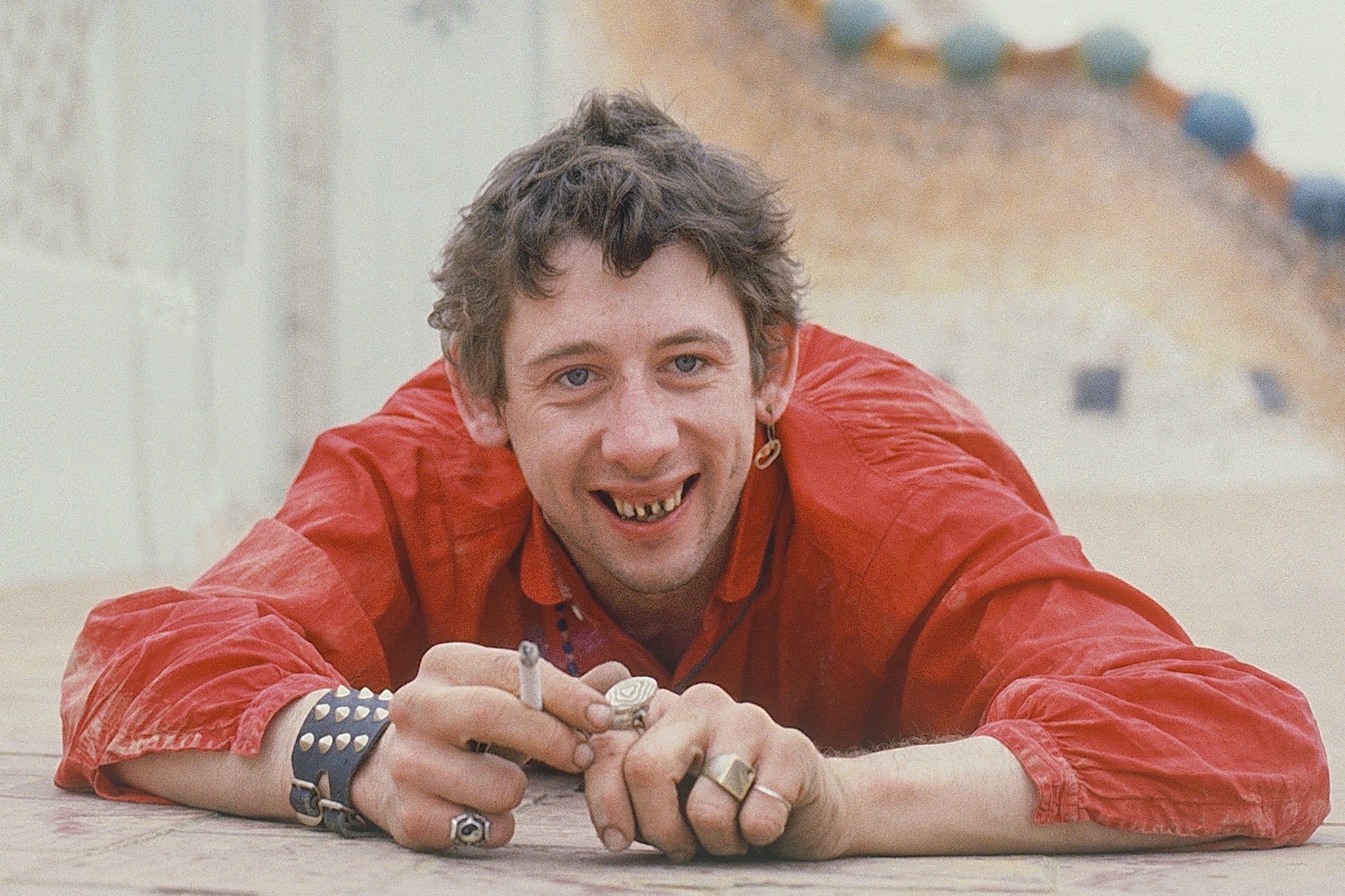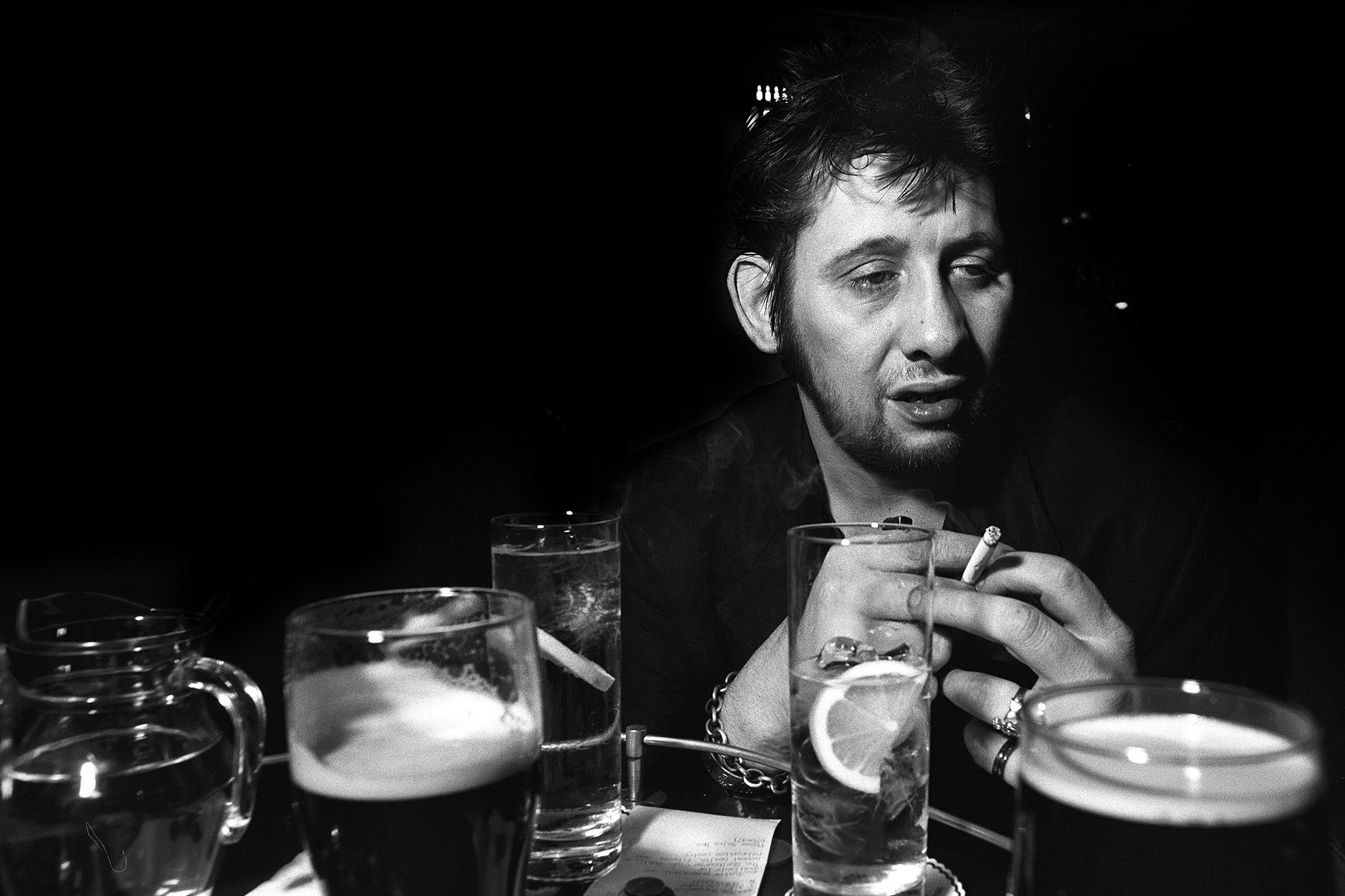Shane MacGowan was a chaotic hellraiser and a natural storyteller who could give you a whole life in a handful of lines
Dorian Lynskey on the chaos and contradictions that made The Pogues’ frontman one of the greatest songwriters of our time, with ‘a mouth like a war zone, a laugh like a poltergeist and a voice like a ragged flame’

For fans, the news that Shane MacGowan has died at the age of 65 inspires mixed emotions: it is both too soon and much later than many people had expected. The former Pogues frontman was both a poetic songwriter, capable of enormous beauty and empathy, and a chaotic hellraiser whose troubles warred with his talent. As with great poets such as Brendan Behan and Dylan Thomas, the creativity and the lifestyle were impossible to disentangle but, since his death, the scale of his artistry has come to the fore. Nick Cave told The Independent that he had lost “a true friend and the greatest songwriter of his generation”.
MacGowan first appeared in the music press in 1976 as a teenage punk fan, dripping blood at a Clash gig. Born in Kent on Christmas Day 1957, raised in Tipperary and the south of England, he was already proud, brilliant and contrarian: clever enough to win a scholarship to Westminster public school but unruly enough to be expelled for drug possession. “If people try to make me do something, I will do the opposite,” he later told The Face. He had suffered from depression since childhood and spent time in a psychiatric hospital, an experience gruesomely recalled in The Pogues’ song “Dark Streets of London”.
MacGowan’s mother was a singer and model; his father a retail manager with literary aspirations. MacGowan read James Joyce’s Ulysses around the age of 10 (“That took me a while”) and became a voracious autodidact with a slaloming mind. In his memoir Here Comes Everybody, former Pogue James Fearnley recalls that when they first met in the late 1970s MacGowan spoke torrentially about “subjects as far apart as Finnegans Wake, the Khmer Rouge and the buxomness of the women depicted on cans of Tennent’s lager”. He would later pour his freewheeling erudition into songs such as the century-hopping, myth-mangling “The Sick Bed of Cuchulainn”.

Punk rock was the making of him. MacGowan’s band The Nips (formerly The Nipple Erectors) supported The Clash and The Jam before splitting up in 1980. Remnants of The Nips and MacGowan’s other band The Millwall Chainsaws merged into Pogue Mahone (a loosely transcribed Irish phrase meaning “kiss my arse”) and acquired a rhythm section. Just as synthesizers were taking over pop, Pogue Mahone were playing traditional Irish folk music with the energy of the Sex Pistols. Brawls were commonplace, on and off the stage. As Tom Waits once put it, “They play like soldiers on leave.” MacGowan was a startling frontman: a mouth like a war zone, a laugh like a poltergeist and a voice like a ragged flame.
In 1984, following complaints to the BBC from Gaelic speakers, Pogue Mahone became The Pogues and released three great albums in a row: Red Roses for Me, the Elvis Costello-produced Rum Sodomy & the Lash and If I Should Fall from Grace with God. They were distinctly Anglo-Irish in both their line-up and their outlook. The MacGowan songs that took place in the present, rather than during the First World War or the Jacobite Rebellion, were usually set in London’s grimy demimonde. Their influence can be heard in bands from Dublin (Lankum), London (The Libertines) and Dublin-to-London (Fontaines DC).

Blazingly intelligent, MacGowan wrote like a man out of time. As well as history and mythology, his songs drank deep from literature, from Behan to Lorca. During a legendary three-way conversation with Nick Cave and The Fall’s Mark E Smith in 1989, MacGowan proved well-versed in Nietzsche, Socrates and Jung.
In 1987, The Pogues narrowly missed out on the Christmas number one in the UK (though not in Ireland) with “Fairytale of New York”, which somehow combines the two classic festive modes – homesick sentimentality and boozy bonhomie – with an abiding theme: the backstreets community of ruined outcasts, bonded by their mistakes and regrets. As guitarist Philip Chevron told Rolling Stone in 1989, “We represent the people who don’t get the breaks… People can look at us and say, ‘My God, if that bunch of tumbledown wrecks can do it, so can I.’ That’s one of the reasons Shane is such a hero.”

MacGowan came to resent the focus on “Fairytale of New York”, which has returned to the Top 40 every Christmas since 2005 and become, he once noted, as much a standard in Irish pubs as “Danny Boy”. After all, he had so many other great songs: the frenzied “Streams of Whiskey”; the love and war of “A Pair of Brown Eyes”; the righteous fury of “Birmingham Six”; the roaring testament to life in the midst of death of “Sally MacLennane”. The Pogues also managed to claim other people’s songs – Ewan MacColl’s “Dirty Old Town”, Eric Bogle’s “The Band Played Waltzing Matilda” – as their own.
MacGowan was a natural storyteller who could give you a whole life in a handful of lines. Take this verse from his perfect love song “A Rainy Night in Soho”: “We watched our friends grow up together/ And we saw them as they fell/ Some of them fell into Heaven/ Some of them fell into Hell.” Or this crushing exchange from “Fairytale of New York”: “I could have been someone,” protests MacGowan. “Well so could anyone,” snaps back Kirsty MacColl. David Simon, who used 1985’s “The Body of an American” in his HBO show The Wire, has been trying for years to co-write a Pogues musical. “The damn thing has already been through about 15 drafts and still isn’t sufficiently wonderful to stand with Shane’s own magnificent storytelling,” he posted on Twitter/X.
I’m not interested in being sober. Drinking makes me see things clearly
MacGowan claimed to write songs under the influence but banjo-player Jem Finer has described him as “a tireless and meticulous editor”. Either way, around 1988 he seemed to lose heart. His drinking, complicated by daily LSD and other drugs, became a cause of concern for his friends and bandmates and of lurid fascination in the press. In interviews (which he hated), MacGowan oscillated between claiming that he had reined in his drinking and insisting that he didn’t need to. “I haven’t been sober, dead-straight sober, since I was 14,” he told Rolling Stone. “I’m not interested in being sober. Drinking makes me see things clearly.” He grew understandably bored with hearing rumours that he was dying, if not already dead. “I’ve been dying for years,” he said derisively. “I’d just think, how boring.”
On the albums Peace and Love and Hell’s Ditch, MacGowan was clearly losing momentum as both a singer and songwriter, leaning heavily on his bandmates’ contributions. Publicly, the band insisted that this was all to the good because they were a democracy, but the singer became increasingly unreliable and estranged from his bandmates, who had to play a prestigious support slot for Bob Dylan without him. Even when he wasn’t incapacitated, MacGowan had come to hate touring. The other Pogues finally pulled the trigger during a miserable tour of Japan in 1991. “You’ve all been very patient with me,” he gamely responded. “What took you so long?” During the 1990s, MacGowan moved back to Ireland and formed a new band, The Popes. He collaborated with the likes of Nick Cave, Sinead O’Connor, The Jesus and Mary Chain and Johnny Depp, who became a lifelong friend.

In 2001, the year that O’Connor cajoled MacGowan into quitting heroin, The Pogues reunited for a Christmas tour, which became something of a tradition for the next decade or so. The shows were compelling – raucous celebrations with a melancholy undertow – but they were pure nostalgia: no new songs emerged. They parted ways for good in 2014. “We’re friends as long as we don’t tour together,” MacGowan explained to Vice.
MacGowan largely withdrew from the public eye, and from music. Though he finally got sober and acquired dental implants, his health worsened. In Julien Temple’s 2020 documentary Crock of Gold: A Few Rounds with Shane MacGowan, he appeared frail and irascible. MacGowan was fortunate to have his fiercely loyal and protective long-time girlfriend Victoria Mary Clarke (they finally married in 2018), who nursed him through a series of injuries which required a wheelchair. Last year, MacGowan published an art book of jagged, surreal illustrations which the critic Waldemar Januszczak praised for their “demented, wild, fascinating, scabrous kind of energy” – a tribute which could apply equally to MacGowan’s music and life.

MacGowan’s friend Bobby Gillespie once took exception to the suggestion that MacGowan had wasted his talent, retorting, “He’s written more good songs than most people.” Indeed some of them were pretty much perfect. But it’s reasonable to wish there had been more and to wonder why there weren’t. As James Fearnley wrote, “More and more the question on people’s lips was whether Shane wrote so beautifully because of the amount he drank, or despite it.”
Slim though MacGowan’s songbook may be, much of it has the timeless gravity of the old songs that inspired him. “I truly believe that a hundred years from now most of us will be forgotten,” Bruce Springsteen said recently, “but I do believe that Shane’s music is going to be remembered and sung. It’s just deep in the nature of it.”
Join our commenting forum
Join thought-provoking conversations, follow other Independent readers and see their replies
Comments
Bookmark popover
Removed from bookmarks